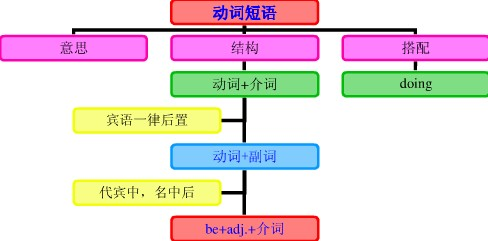本试题 “—Did Alice enjoy the concert held in Grand Theater yesterday?—Yes, she did. She ______ such an excellent concert for a long time.[ ]A. didn’t take ...” 主要考查您对动词短语
过去完成时
等考点的理解。关于这些考点您可以点击下面的选项卡查看详细档案。
- 动词短语
- 过去完成时
动词短语的概念:
动词常和某些其他词类用在一起,构成固定词组,形成所谓短语动词(phrasalverb)。和动词一样,短语动词也可分为及物和不及物两种。短语动词可以作为一个整体看待,同一般动词一样使用。
动词短语的搭配类型:
1)动词+介词:这类短语动词用作及物动词,后面须跟宾语。
如:The small boy insisted on going with his parents. 那男孩坚持要跟父母一起去。
Do you often listen to broadcasts in English? 你常听英语广播吗?
Look at the children. Aren't they lovely? 看着这些孩子们。他们多么可爱呀!
We stand for self-reliance. 我们是主张自力更生的。
这一类的短语动词还有很多,如depend on(upon)(依靠),wait on(服侍),look for(寻找),deal with(对待),look after(照料),wait for(等待)等。
2)动词+副词:
这类短语动词有的用作及物动词,有的用作不及物动词。
如:I always get up as soon as the bell rings. 我总是一打铃就起床。(不及物)
Look out, there's a car coming! 当心,来汽车了!(不及物)
Have you handed in your exercises already? 你已经交练习了吗?(及物)
Please don't forget to put on your coat, it's cold outside. 请不要忘记穿外衣,外面很冷。(及物)
这一类的短语动词还有很多,及物如put out(扑灭),eat up(吃光),put down(放下);不及物如set off(出发),come up(走近),go on(继续)。
注:"动词+副词"这类短语动词和上面第一类"动词+介词"的不同之处在于:"动词+介词"用作及物动词,后面须跟宾语。"动词+副词"则有的及物,有的不及物;用作及物动词而宾语为人称代词或自身代词时,副词往往放在宾语之后。
如:Please wake me up at five tomorrow. 请在明天早上五点唤醒我。
If you have done your exercises, please hand them in. 如果你们练习做完了请交来。
She doesn't normally behave like that, she's putting it on. 她通常并不如此表现,她是装出来的。
注:这类短语动词有不少可兼作及物和不及物动词用。
如:He took off his hat when he entered the office. 他进办公室后脱下帽子。(及物)
The plane took off at seven sharp. 飞机在七点整起飞。(不及物)
Charlie rang up Neil to ask about the time of the meeting. 查理打电话给尼尔问开会的时间。(及物)
If you can't come, please ring up and let us know. 你如来不了,请来电话告诉我们一声。(不及物)
3)动词+副词+介词:
"动词+副词"之后有的可以再加一个介词,形成另一种短语动词。这类短语动词用作及物动词。
如:Do not give up hope. We must go on with the experiment 不要失望。我们必须继续试验。(go on with继续)
He came up to me. 他走到我跟前。(come up to走近)
这类短语动词还有:look down upon(看不起),do away with(去掉),put up with(忍受)等。
4)动词+名词+介词:
这类短语动词也是及物的。
如:He shook hands with all the guests at the banquet. 他在宴会上和宾客一一握手。
Young pioneers often come to the Children's Palace to take part in after school activities.少先队员经常到少年宫来参加课外活动。
Pay attention to the temperature of the stored rice. 注意仓库里的稻谷的温度。
Her job is taking care of the babies. 她的工作是照顾婴儿。
这一类短语动词还有:put an end to(结束),take notice of(注意),catch hold of(抓住),lose sight of(看不见),make use of(利用)等。
动词短语知识体系:

过去完成时的概念:
过去完成时既可表示过去某个时间或动作之前所发生的事情,也可表示过去某个时间或动作之 前所发生的动作一直持续到过去某个时间。过去完成时由“had+过去分词”构成。
如:She had leant 2000 English words by the end of last month.
过去完成时的应用:
(1)与过去完成时连用的时间状语可以多种多样,使用它的主要依据是看其是否发生在“过去的过去”。
如:He had learnt some English before I went here. 在来这儿之前我学过一些英语。
He had written three stories by last year.到去年他已经写了三篇故事。
We had cleaned the room when he got there. 当他到那儿时,我们已经把房子弄干净了。
He went there after he had finished his work. 他把事做完之后,就去哪儿了。
注意:当主句跟由before, after, as soon as所引导的时间从句的动作连接很紧密时,从句也可用一般过去时。
如:He went there after he read the letter. 他看了那封信后就去那儿了。
(2)过去完成时还经常用于主句为过去时的宾语从句中。
如:He said he had been a soldier. 他说他当过兵。
They said they had seen the film. 他们说这幕电影他们看过。
(3)在hardly/scarcely…when…,nosooner…than…两个结构中的主句通常要用过去完成时。
如:Hardly had I told her the news when she began to cry out. 她一听到这一消息就大哭了起来。
Scarcely had he finished his supper when he went out. 他已吃完晚饭就出去了。
No sooner had he fallen asleep than he lay down on the bed. 他一躺倒床上就睡着了。
(4)动词expect, hope, suppose, think, want等的过去完成时可用来表示未实现的计划、打算或希望。
如:I had hoped to see you. 我本希望来看你。
He had wanted to buy a house in Beijing. 他本想在北京买栋房子。
过去完成时与一般过去时:
(1)过去完成时表示以过去某时间为起点以前所发生的动作或存在的状态,即:过去完成时强调“过去的过去”,而一般过去时只表示以现在时间为起点以前所发生的事情或存在的状态。
如:He studied there two years ago. 他在那儿学习了两年。(离现在两年)
He said he had studied there two years ago. 他说他在那儿学习了两年。(离他说话时两年)
(2)表示过去某个时间以前所连续发生的两个或两个以上的动作时,一般用and, then, but按照动作的先后顺序连接,此时通常用一般过去时而不用过去完成时。
如:He said he went the shop and bought some food. 他说他去商店买了一些食品。
(3)两个动作相继发生,可用一般过去时;如第一个动作需要若干时间完成,用过去完成时。
如:When I heard the news, I was very excited.
(4)叙述历史事实,可不用过去完成时,而只用一般过去时。
如:Our teacher told us that Columbus discovered America in1492.
与“—Did Alice enjoy the concert held in Grand Theater yester...”考查相似的试题有:
- He__________ a good example to us.[ ]A. set aboutB. set offC. set outD. set up
- The old man was the only person on the spot, so the policeman asked him to _____ the facts as heremembered them.[ ]A....
- Shall we _______ our discussion and have some tea or coffee?A.break downB.break offC.break intoD.break out
- Mum, could you lend me a few dollars until I ______ at the end of this month?A.had been paidB.got paidC.have paidD...
- What advantages do you think London ________other cities in hosting the 30th Olympic Games?[ ]A. takes ofB. has overC...
- The interviewee’s application for the job didn’t because his argument failed to carry logical evidence.A.respondB.s...
- .The idea of traveling abroad really__________a lot of Chinese people. That’s why every year witnesses more people ap...
- Social networking is an important factor _______ business success.A.devoting toB.appealing toC.attaching toD.lead...
- They own two cars, not to ___ a motorbike.A.speakB.sayC.talkD.mention
- —It’s many years since I saw you last, I _____ you at all.—I wouldn’t have, either, if someone _____ you by the name....